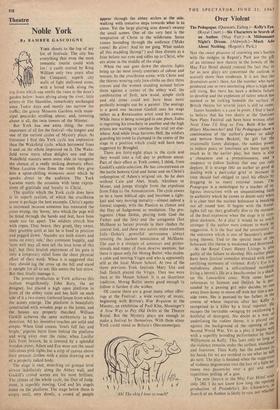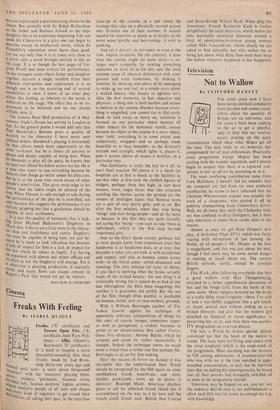Over Violent
The Pedagogue. (Questors, Ealing.)—Kelly's Eye. (Royal Court.)—Six Characters in Search of an Author. (May Fair.)—A Midsummer Night's Dream. (Aldwych.)—Much Ado About Nothing. (Regent's Park.)
NoT the sweet pleasure of renewing one's battles with the midgies in Regent's Park nor the gift of an intimate new theatre in the bowels of the May Fair Hotel should conceal the fact that as far as new plays are concerned the outlook is scarcely more than moderate. It is not that the dramatists aren't there, for the number who have produced one or two interesting plays is high and still rising. But there has been a definite failure to develop and the explosion of talent which has seemed to be lurking beneath the surface of British theatre for several years is still to come.
James Saunders is a case in point; I find it hard to believe that his two shorts at the Questors New Plays Festival can have been written after Next Time I'll Sing to You. Both Who was Hilary Maconochie? and The Pedagogue show a continuation of the author's power to adapt and borrow from Beckett; the gift for the irrationally funny dialogue, the sudden power to induce panic or loneliness are there quite as much as in the earlier play, but there is alSO a cheapness and a pretentiousness, and a tendency to' follow fashion that one can only deplore. It is strange that an author so good at dealing with 'a particular grief 'or moment M time should feel obliged to spoil his effects bY dragging in so many external issues. Tirt Pedagogue is a monologue by a teacher of re- ligious instruction- with an unquestioning faith
in authority which he comes to doubt only whenit is clear that the nuclear holocaust is breaking
out all round him. It begins with the house- lights full up; they gradually dim to the moment of the final explosion when the stage is in com- plete darkness. As a play it would be so much stronger if the author were content to work by suggestion. It is the fear and the uncertainty of the unknown which is one of Saunders's under- lying themes. Tied to the special issue of the holocaust this theme is weakened and destroYed.
At the Royal Court Henry Livings is also guilty of the failure to develop. His earlier plays have been farcical comedies streaked with some terrifying moments of violence. Kelly's Eye IS 3 melodrama about a self-confessed murderer living a hermit's life as a beachcomber in a shack on the Lancashire coast. With some heavY references to Samson and Delilah he is per- suaded by a passing girl who decides to roil away from home to move off with her into a sea- side town. She is pursued by her father, in the course of whose inquiries after her Kelly is recognised as a killer by a local reporter. He escapes the inevitable swinging by swallowing a bottleful of detergent. No doubt as a way of underlining the violent theme, it is played out against the background of the opening of the Second World War. Yet as a play it begins we with a superbly brooding performance by Nicol Williamson as Kelly. This lasts only so long as the violence remains under the surface, undefined and fearsome. Then Kelly has the audience irt his hands for we are terrified to see what hi... do next. The play is finished when the suggestion of violence degenerates into the fact of a fight be- tween two passers-by over a girl and some repetitious pulling of a gun. The new theatre in the May Fair Hotel seatig,t5 only 280. 1 do not know how long the open' production of Pirandello's Six Characters ll; Search of an Author is likely to run, nor whethe tve can expect such a discriminating choice in the future. But certainly with Sir Ralph Richardson as the father and Barbara Jtgord as the step- daughter this is an auspicious beginning. I do not think Six Characters is a play one can begin to describe except in intellectual terms, which do Pirandello's reputation more harm than good. Let me say only that it is at times very close to a novel, only a novel brought entirely to life on the stage. It is as though the best pages of Vir- ginia Woolf had been written for performance. In the strongest scene where father and daughter together recreate a single incident from their different view-points and experiences it is as though one is on the receiving end of several sensibilities at once. I know of no other play where this feeling, so inherent to the novel, is achieved on the stage. The effect has to be ex- , perienced to be believed and no one should Wilfully miss it. The famous Peter Hall production of A Mid- slimmer Night's Dream has arrived in London at last. To the general praise I would add only that Paul Hardwick's Bottom gives a quality of warmth to the character 1 have never seen he before. Hardwick's playing is restrained; oe thus allows much more opportunity to the other workmen, but he is above all anxious to Please and deeply capable of being hurt. When he demands to play all the parts, he knows that he must not offend hisdellow actors too far. He is a man who wants to run everything because he believes that things go. better under his direction, but he is at the same time much aware of other People's sensitivities. This gives extra edge to his horror that the ladies might be afeared of the lion. When Theseus is rude enough to talk during the performance of the play he is mortified, not only because this suggests the performance is not entirely gripping but that a gentleman should be capable of such tactlessness. It is just this quality of humanity that is lack- ing from Michael Blakemore's Dogberry in Much Ado. 1 like to see a little more in the charac- ter than just foolishness and vanity. Dogberry 100 must be capable of being hurt, not just be- cause he is made to look ridiculous but because lack of respect for him is a lack of respect for the law which he values so highly. Try having an argument with almost any minor official and as s often as not the Dogberry will emerge. ,Yet it is otherwise a pleasing production, if unevenly acted, and many flaws can escape censure in Regent's Park that would not get by indoors.
MALCOLM RUTIIERFORD



































 Previous page
Previous page